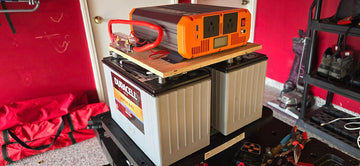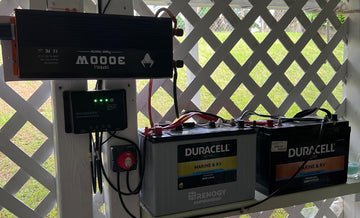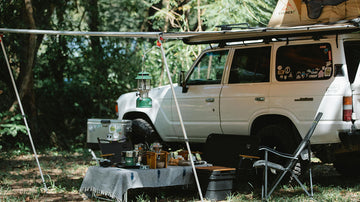100Ah batteries are a standard option for energy storage, but without the right inverter, even the best batteries won't deliver the performance you expect. In this guide, we'll tell you everything you need to know - how much power a 100Ah battery can deliver, what size inverter is ideal, and common usage scenarios.
How much power does a 100Ah battery provide?
How much power can a 100Ah battery provide? To fully utilize the potential of a 100Ah battery, you first need to clarify its power supply capacity. The power of a battery is determined by both voltage and capacitance. A 12V 100Ah battery, for example, has a total energy of 1200Wh (12V x 100Ah = 1200Wh)
However, it is not possible to fully deplete the battery while using it, which would permanently damage it. The actual available energy depends on the battery chemistry and the depth of discharge.
- Lead-acid batteries: Can be safely discharged to 50%, which means only 600 watt-hours can be used.
- Lithium batteries: Can be discharged to 90-95% and can be used for 1080 Watt-hours to 1140 Watt-hours.

How to choose the right inverter for your 100Ah battery?
The capacity of the battery does not directly determine the size of the inverter, which acts as a 'bridge' to convert the DC power stored in the battery to the AC power required by the household appliances. Matching the right inverter to a 100Ah battery requires the following considerations:
1. Determine the total power of the devices you plan to run
the power of the inverter, it should match the total power of the devices you plan to run. First, list the devices you want to run at the same time (e.g., lights, TVs, fans, refrigerators, etc.), then add up their total power ratings and add a buffer capacity of 20-30%. The final calculation is the inverter power you need.
Devices commonly used to power 12V 100Ah lithium batteries during operation and their power requirements:
| Equipment | Power |
| LED lights | 10W |
| Cell phone chargers | 15W |
| Laptop computers | 60W |
| Portable fans | 40W |
| Car refrigerators | 60W |
| Coffee makers | 600W |
It is important to note that motor-type equipment requires peak power for startup, usually 2-5 times the rated value. Many inverters are labeled for continuous power only, so make sure you choose an inverter that can also handle surge power requirements.
For 12V 100Ah Li-ion batteries, a 1000W inverter is usually a smart and balanced choice. It allows you to efficiently utilize about 80% of the battery's available capacity while still being able to power some common household appliances without the risk of overloading the system.
2. Consider inverter efficiency
When choosing an inverter, an often overlooked but crucial factor is inverter efficiency. Not all of the power stored in your batteries is delivered to your appliances - there is inevitably some loss in the DC to AC conversion process. The more efficient your inverter is, the more usable power you'll get from your batteries.
A good quality inverter can be up to 90% efficient; it absorbs 1140Wh from a 12V 100Ah battery and can deliver 1026Wh to your appliance (1140Wh x 0.9 = 1026Wh). Using an inefficient inverter for a long period, the extra power loss is equivalent to hidden costs.
More efficient inverters at Topbull

3. Determining the inverter type: pure sine wave vs modified sine wave
The output waveform of an inverter determines its suitability for powering certain sensitive equipment:
- Pure Sine Wave Inverter: Provides the same quality of current as that from the grid and is suitable for all electronic equipment, especially TVs, refrigerators, laptops, medical equipment, etc.
- Modified sine wave inverters: Cheaper but prone to overheating, noise, or damage to equipment, especially not suitable for inductive loads.
If your system includes sensitive equipment, always choose a pure sine wave inverter.
Learn More: Modified vs Pure Sine Wave Inverter: What is the Difference?
100Ah battery practical application
Caravanning and camping
For caravanning and camping enthusiasts, where short periods of range may often be sufficient, lithium batteries become the preferred choice. 12V 100Ah lithium batteries, when paired with a 600W-1000W inverter, can reliably power the following devices:
- LED lighting
- Fans
- Coffee makers
- Laptops and cell phones
- 12V Refrigerator or portable coolers
- TVs and sound systems
A fully charged 100Ah Li-Ion battery is good for one night's basic use, with solar panels for charging during the day and low-power devices prioritized for nighttime use.
Outdoor mobile power
Portability and reliability are primary considerations for those on outdoor adventures or working on the move. The compact 100Ah battery provides convenient AC power from a 300W-500W inverter.
Home backup power
In areas prone to storms, power outages, or grid failures, a 100Ah battery-inverter combination can keep vital equipment online for hours. In the case of longer power outages, multiple batteries can be connected in parallel to increase the power supply capacity.
A pure sine wave inverter ensures the safe and smooth operation of sensitive electronic equipment without the adverse effects of modified wave energy.
Tips to extend the life of your 100Ah battery
When people use 100Ah batteries for power, they usually shorten the life of the batteries due to incorrect usage habits. Here are some tips to help you maximize battery life.
Control the depth of discharge.
Although lithium batteries are more durable than lead-acid batteries, each time they are fully discharged, they accelerate the aging of the battery, and it is recommended that 20-30% of the charge is left at a time every time to prolong the life of the battery. Or use a battery management system (BMS) with monitoring to avoid over-discharging the battery.
Choose a high-efficiency inverter.
A high-efficiency inverter means less battery loss. Less heat generation, longer run time, and less stress on the battery, which directly extends battery life.
Maintain a good temperature environment.
The ideal operating temperature for lithium batteries is 0°C to 40°C (32°F-104°F). Excessive cold restricts charging, and excessive heat damages the cell structure. In winter, you can use batteries with heat or insulated sleeves; in summer, keep them ventilated and out of direct sunlight during high use.
Maintaining Proper Charging Settings
It is critical to use a smart charger that is compatible with lithium batteries. The charging voltage should be controlled at 14.4V ± 0.2V (12V system), and the charging current is recommended to be no more than 0.5C of the battery capacity (i.e., 50A). An unsuitable charger may result in over- or under-charging, seriously affecting the cycle life.
Avoid long periods of inactivity without use.
If left unused, the battery will still lose energy slowly due to self-discharge and BMS standby power drain, even if the load is disconnected. If stored for a long period of time, maintain a battery condition of 50-60% and perform shallow charge/discharge cycles every 2-3 months.
Learn More: How to Safely Connect a Battery to an Inverter?
Can a 100Ah battery withstand a 2000W inverter?
Theoretically, it's possible, but it's not recommended to use it this way in a long-term practical application, especially in a single battery configuration.
A 12V 100Ah LiPo battery driving a 2000W inverter would require an input current of approximately:
2000W/12V≈167A
This means that your battery would have to put out more than 160 amps for a short period of time, which is close to or above the maximum continuous current limit for most standard 100Ah batteries. Assuming the inverter is 80% efficient when it is, the 100Ah LiPo battery will be able to supply power for no more than 30 minutes.
Running a 2000W inverter for a long period of time will shorten the life of the 100Ah battery, leading to heating and degradation of the battery's performance. It is recommended to replace the battery with a larger capacity battery, such as a 200Ah battery.
FAQ
Q: Can a 100-Ah battery run a refrigerator?
A: Yes, a 100 Ah battery can run a small or medium-sized refrigerator energy saving, especially the energy-saving models of 12V or 120V refrigerators. Typically, it can support the refrigerator to run for about 10-20 hours, depending on the power of the refrigerator, the frequency of compressor cycle, and whether the power is continuously supplied. The relay time can also be extended if configured with a solar system or with intermittent operation.
Q: How long does a 100Ah battery last when using a laptop?
A: A 100Ah 12V battery can power a laptop (about 60W power consumption) for about 16 to 18 hours. The actual time is affected by the efficiency of the inverter and the usage of the computer.
Q: How long will a 100Ah battery run an inverter?
A: A 100Ah 12V battery can run an inverter for 1 to 10 hours, depending on the load. For light loads like 100W, it may last around 10 hours; for heavy loads like 1000W, about 1 hour.
















